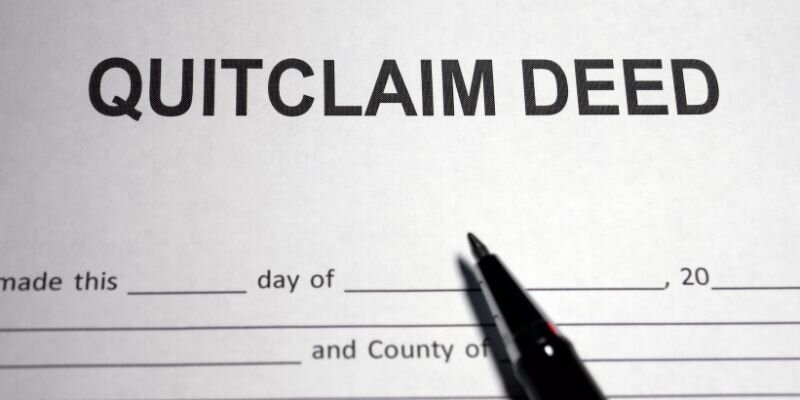
Understanding Quitclaim Deeds: A Comprehensive Guide
A quitclaim deed is a legal instrument used in real estate to transfer ownership interest from one party to another without making any warranties or guarantees about the property’s title. This type of deed is commonly utilized in Seattle, WA, for transferring property between family members, resolving title issues, or when there is mutual trust between the involved parties.
Unlike warranty deeds, quitclaim deeds do not provide assurances against claims or liens on the property. In Seattle’s real estate market, understanding the specifics of quitclaim deeds is crucial since they involve relinquishing any rights or claims to the property rather than confirming clear ownership.
The process requires precise documentation and adherence to Washington state laws to ensure validity and avoid future disputes. Quitclaim deeds are often used for fast and simple property transfers. Still, it’s essential to fully understand what they mean and the possible problems arising from unclear ownership records or existing claims on the property.
Common Uses and Benefits of Quitclaim Deeds
For these reasons, quitclaim deeds are the method of choice for transferring property ownership in Seattle, WA. If you need to add or remove a spouse’s name from a property deed after a marriage or divorce, for example, these deeds are ideal.
The use of quitclaim deeds speeds up the process of resolving title disputes and allows for the transfer of property without going through the usual sale procedure. Assuming all parties are in agreement over the ownership of the property, they can help smooth the way for its transfer into a trust or to other business associates.
One of the most significant benefits is their simplicity and speed; quitclaim deeds require less paperwork than warranty deeds, making them a cost-effective option for straightforward transactions where the parties involved do not need extensive guarantees on the property’s title. Additionally, they frequently resolve title issues by relinquishing any potential claim to the property, thereby avoiding protracted legal disputes. The parties involved do not need extensive guarantees on the property’s title. If you’re exploring other ways to transfer ownership efficiently, learn more about how Sell My House buys homes for hassle-free transactions in Seattle.
While quitclaim deeds do not offer protection against future claims on the title, their ease of use makes them invaluable for specific scenarios that require quick adjustments to ownership records in Seattle’s dynamic real estate market.
Differences Between Quitclaim Deeds and Warranty Deeds
Quitclaim deeds and warranty deeds serve distinct purposes in real estate transactions, each offering different levels of protection and assurance. A quitclaim deed transfers whatever interest the grantor may have in a property without any guarantees or warranties about the state of the title. This makes it useful for family-related transfers, clearing up title issues, or situations where someone needs to remove a name from a deed quickly and efficiently.
In contrast, a warranty deed guarantees that the grantor holds a clear title to the property, free from encumbrances, and promises to defend against future claims. This assurance makes warranty deeds more appropriate for standard real estate sales where buyers expect full ownership protection.
In Seattle, Washington, understanding these distinctions is essential. While quitclaim deeds offer speed and simplicity, they lack the stronger safeguards that warranty deeds provide. Therefore, when considering a quitclaim deed in Seattle, property owners should evaluate whether this deed type truly fits their needs compared to the comprehensive assurances that come with a warranty deed.
Key Elements of a Valid Quitclaim Deed Document

A quitclaim deed in Seattle, WA, must adhere to specific key elements to be considered valid. The document should identify the grantor, who is transferring their interest in the property, and the grantee, who is receiving this interest.
Accurate legal descriptions of the real estate involved are essential for ensuring clarity and avoiding future disputes. The quitclaim deed must explicitly state that it conveys any interest the grantor possesses without guaranteeing title validity or freedom from encumbrances.
In Washington State, both parties’ signatures are required, with the grantor’s signature needing notarization to authenticate the document officially. Furthermore, recording the quitclaim deed with King County’s Recorder’s Office solidifies its legality and public notice of the transaction.
Following these elements meticulously facilitates a smooth real estate transfer process and safeguards all parties involved from potential legal complications.
Essential Legal Considerations for Quitclaim Deeds
Understanding the essential legal considerations when filing a quitclaim deed for real estate in Seattle, WA, is critical for guaranteeing a smooth and valid property transfer. A quitclaim deed is a legal document used to transfer ownership interest in real estate without warranties or guarantees regarding the title’s status.
It is essential that the grantor, the person transferring their interest, clearly understands their rights and any encumbrances on the property, as a quitclaim deed does not protect against potential claims by third parties. In Seattle, the quitclaim deed must be properly drafted to include specific information such as the names of the grantor and grantee and a detailed description of the property and must be signed by all parties involved.
The document must then be notarized before being recorded with the King County Recorder’s Office to make it legally binding. Additionally, both parties should consider consulting a real estate attorney to address any legal implications or obligations arising from arising from using a quitclaim deed in Washington State. If you need guidance or assistance with your real estate transaction, don’t hesitate to contact us for professional support.
Understanding these factors helps ensure compliance with state laws and protects all involved parties during this straightforward yet significant transaction process.
Importance of Accurate Property Description in Quitclaim Deeds
Ensuring an accurate property description is paramount when filing a quitclaim deed for real estate in Seattle, WA. The property description serves as the legal identifier of the transferred real estate and must be precise to prevent future disputes or legal challenges.
Inaccuracies in the property description can lead to complications such as boundary disputes, ownership conflicts, or even invalidation of the deed. Using the exact language in the property’s existing legal documents, such as previous deeds or county records, is essential.
The King County Assessor’s Office may assign parcel numbers, lot numbers from recorded plats, or metes and bounds descriptions. Without a precise and accurate description, the grantor and grantee cannot be sure that they are receiving the exact piece of real estate intended.
The property description in the quitclaim deed must be in accordance with Washington state laws and Seattle specific regulations; a real estate attorney or title business can help with this.
Legal Requirements for Signing a Quitclaim Deed in Washington State

In Washington State, executing a quitclaim deed requires adherence to specific legal requirements to ensure validity. The grantor, transferring their interest in the property, must sign the quitclaim deed before a notary public to authenticate the document.
In Seattle and the rest of Washington, having a document notarized is essential since it proves the identity of the signer and that they were not coerced into signing. It is vital to accurately complete all fields on the deed form; however, witnesses are not required for a quitclaim deed in Washington, unlike some other states.
The legal description of the property must be precise, and the parcel must be identified with exactitude to prevent future disputes. Additionally, it’s essential to clearly include the names of both parties—the grantor and grantee—on the document.
After being duly signed and notarized, the quitclaim deed must be properly recorded with the King County Recorder’s Office in order to safeguard the land records and prevent unauthorized parties from accessing them. As part of the recording procedure, you’ll need to pay any fees that are relevant and check that your documents are formatted according to local rules.
Notarization Process for a Quitclaim Deed Explained
The notarization process for a quitclaim deed in Seattle, WA, involves several crucial steps to ensure the document’s legality and validity. Once you have prepared your quitclaim deed with all necessary information, including the grantor and grantee details and a precise description of the property involved, having the document notarized before it can be recorded is essential.
In Washington State, a licensed notary public must witness the signing of the quitclaim deed by the grantor. The notary’s role is to verify the identity of the person signing and confirm that they are doing so voluntarily and without coercion.
This step is critical because it adds more to the transaction, reassuring all parties involved. After signing, the notary will affix their official seal and signature to the deed, completing the notarization process.
After completing this step, you can proceed to record your quitclaim deed with King County’s Recorder’s Office in Seattle, ensuring your real estate transaction is legally recognized.
Step-by-step Process to File a Quitclaim Deed
In Washington, there are a few important steps that must be taken in order for the transfer of property rights to be legal. You can start by getting a quitclaim deed form, which you can do online or at an office supply shop.
Include correct information on the form, such as the names of the grantor and grantee and a full legal description of the land in question. It is very important to have the paper notarized, which means that you must sign it in front of a notary public to prove that it is real.
After getting the quitclaim deed signed, take it to the King County Recorder’s Office to be officially recorded. For this step, you need to pay a recording fee and, if necessary, the office income tax, which is based on current rates and rules in Washington State and King County.
Ensure all information is double-checked for accuracy to avoid processing delays or rejections. After recording, retain copies of all documents for personal records and future reference regarding property ownership changes within Washington’s jurisdiction. If you’re considering using a quitclaim deed but want to sell your house fast in Auburn instead, our team can help you explore your options.
Filing Fees and Costs Associated with Quitclaim Deeds in Seattle, WA
When filing a quitclaim deed in Seattle, WA, it’s essential to understand the associated costs and fees. The primary expense is the recording fee charged by the King County Recorder’s Office, which processes all real estate transactions within the county.
As of the LOFOffice update, his fee typically varies based on the number of pages in your document and other factors such as additional administrative charges. It’s advisable to check with the King County Recorder’s official website or contact their office for current rates.
In addition to the recording expenses, you may also have to pay for professional help like an attorney to help you write your quitclaim deed or make sure it follows Washington state rules. Also, quitclaim deeds usually don’t have transfer taxes like warranty deeds do. However, it’s important to check if any municipal taxes apply to your scenario.
Understanding these potential expenses helps ensure a smooth process when transferring property rights using a quitclaim deed in Seattle.
How to File a Quitclaim Deed in King County, Washington?
Filing a quitclaim deed in King County, Washington, involves several essential steps to ensure that the transfer of real estate ownership is legally binding and properly recorded. First, obtain a quitclaim deed form, which can be found at local office supply stores or online legal form providers.
Ensure the form includes all necessary details, such as the grantor’s and grantee’s names and addresses, a legal description of the property, and any relevant parcel numbers. Next, both parties must sign the document in front of the public to validate their identities and intentions.
After getting the quitclaim deed signed, take it to the King County Recorder’s Office to be recorded. This is a very important step because it changes the public records to show that the land now belongs to someone else.
Pay attention to any applicable fees for recording services; these vary based on page count and additional requirements like excise tax affidavits, if appropriate. By following these steps meticulously, you ensure compliance with King County regulations and secure your real estate transaction in Seattle efficiently.
What Are the Requirements for a Quitclaim Deed in Washington State?
In order for a quitclaim deed to be legitimate and enforceable in Washington State, several legal requirements must be fulfilled when filing it. The complete legal names of the persons transferring and receiving property are required to be included in a quitclaim document.
A precise legal description of the land should be included in the deed, which can be located in the county records or in previous deeds. To ensure the quitclaim deed is legitimate, a notary public must witness the grantor’s signature in Washington.
Additionally, in Seattle and other parts of Washington State, recording the quitclaim deed with the county auditor’s office where the property is located is crucial for public notice and officially updating ownership records. It’s important to note that while a quitclaim deed transfers whatever interest the grantor has in a property, it does not guarantee a clear title, meaning any existing liens or encumbrances remain unless otherwise cleared.
Finally, paying applicable recording fees at submission ensures proper processing by county officials. These requirements are designed to protect all parties involved and maintain accurate real estate records within Washington State.
How Do I Record a Quitclaim Deed in Washington State?

To record a quitclaim deed in Washington State, including Seattle, you must follow specific steps to ensure the process is completed accurately. First, complete the quitclaim deed form with all necessary details, such as the names of the grantor and grantee, the legal description of the property, and any other pertinent information.
It is crucial to use a legally compliant form that meets Washington State requirements. Once the form is filled out correctly, have the grantor sign it before a notary public to validate its authenticity.
After notarization, you must submit the quitclaim deed to the county auditor’s office of the county where the property is located—in this case, King County, for properties within the county. Pay attention to recording fees, which vary by county; these must be paid at the time of submission.
Additionally, check for any local transfers or excise taxes applicable when recording your quitclaim deed in Washington State. By adhering to these essential steps and ensuring compliance with local requirements, you can successfully record your quitclaim deed and update property ownership records efficiently.
Can You Do a Quitclaim Deed Yourself?
Yes, you can file a quitclaim deed when dealing with real estate in Seattle, WA. This process involves several essential steps, and understanding the requirements is crucial for a smooth transaction.
To start, you’ll need to obtain a quitclaim deed specific to Washington State. These forms are often available online or at local office supply stores.
It’s important to accurately fill out the form with all necessary details, including the grantor’s and grantee’s information, a legal description of the property, and any relevant parcel numbers. Once completed, both parties must sign the document before a notary public to ensure it is legally binding.
After notarization, you should file the quitclaim deed with the King County Recorder’s Office in Seattle to update public records officially. While doing this process yourself can save on legal fees, it’s vital to ensure accuracy to avoid potential future property ownership issues. If you’d rather skip the paperwork and sell directly, remember to check cash home buyers in Yelm.
Helpful Seattle Blog Articles
- Homeowners Insurance When Selling Your Seattle, WA, Home
- Guide To Selling Your Parents’ House In Seattle, WA
- Can An Hoa Take Your House in Seattle, WA?
- Closing Costs When Selling Your Home Without A Realtor in Seattle, WA
- Understanding HOA Foreclosure Rights On Homes In Seattle, WA
- Selling A Water-damaged House In Seattle, WA
- Guide To Selling A Tenant-occupied House In Seattle, WA
- Selling A House With Title Issues In Seattle, WA, Real Estate Market
- Filing A Quitclaim Deed For Real Estate In Seattle, WA
- Sell Your House in Seattle, WA, to Pay Off Debt
- Selling Shares of Your Home in Seattle, WA
- Selling a Home that Needs Repairs in Seattle, WA

| CONVEYANCES | LEGAL SERVICES | LAWYER | REAL PROPERTY | PLLC | GIFT |
| MORTGAGE | TRUSTEE | LIVING TRUST | TITLE INSURANCE | MONEY | LOAN |
| LIABILITY | LEGAL ADVICE | TENANTS | INSURANCE | FREQUENTLY ASKED QUESTIONS | FAQ |
| ESTATE PLANNING | TENANTS IN COMMON | JOINT TENANTS | ESTATE EXCISE TAX | REAL ESTATE EXCISE TAX |
